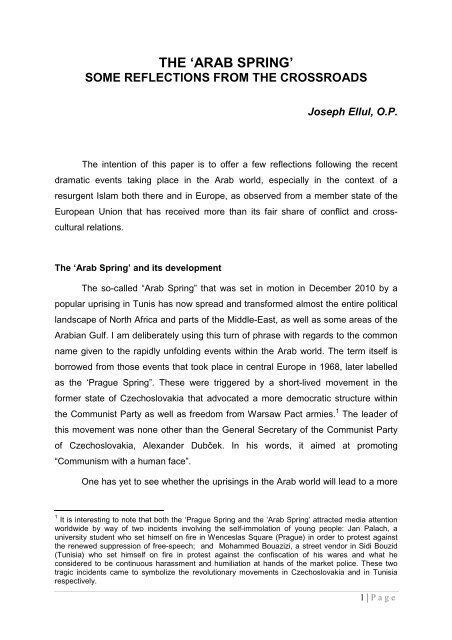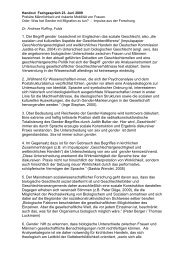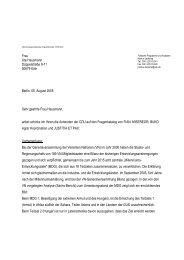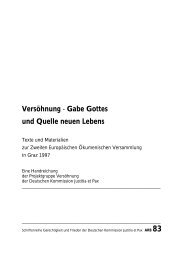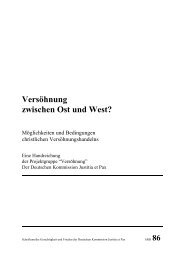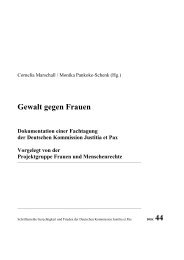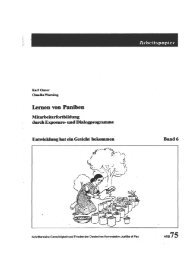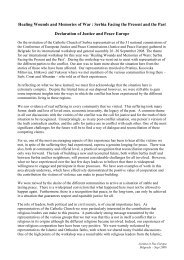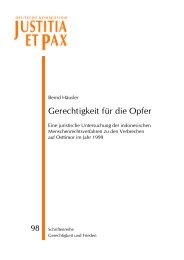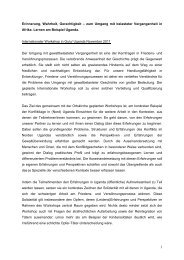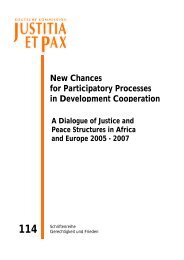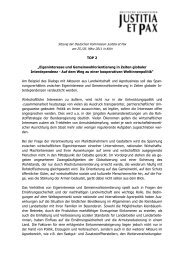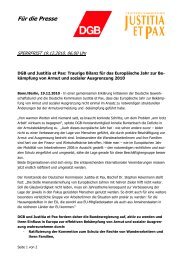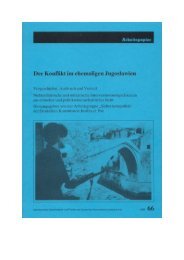Fr Joseph Ellul OP - Justitia et Pax
Fr Joseph Ellul OP - Justitia et Pax
Fr Joseph Ellul OP - Justitia et Pax
Create successful ePaper yourself
Turn your PDF publications into a flip-book with our unique Google optimized e-Paper software.
THE ‘ARAB SPRING’<br />
SOME REFLECTIONS FROM THE CROSSROADS<br />
<strong>Joseph</strong> <strong>Ellul</strong>, O.P.<br />
The intention of this paper is to offer a few reflections following the recent<br />
dramatic events taking place in the Arab world, especially in the context of a<br />
resurgent Islam both there and in Europe, as observed from a member state of the<br />
European Union that has received more than its fair share of conflict and crosscultural<br />
relations.<br />
The ‘Arab Spring’ and its development<br />
The so-called “Arab Spring” that was s<strong>et</strong> in motion in December 2010 by a<br />
popular uprising in Tunis has now spread and transformed almost the entire political<br />
landscape of North Africa and parts of the Middle-East, as well as some areas of the<br />
Arabian Gulf. I am deliberately using this turn of phrase with regards to the common<br />
name given to the rapidly unfolding events within the Arab world. The term itself is<br />
borrowed from those events that took place in central Europe in 1968, later labelled<br />
as the ‘Prague Spring”. These were triggered by a short-lived movement in the<br />
former state of Czechoslovakia that advocated a more democratic structure within<br />
the Communist Party as well as freedom from Warsaw Pact armies. 1 The leader of<br />
this movement was none other than the General Secr<strong>et</strong>ary of the Communist Party<br />
of Czechoslovakia, Alexander Dubček. In his words, it aimed at promoting<br />
“Communism with a human face”.<br />
One has y<strong>et</strong> to see wh<strong>et</strong>her the uprisings in the Arab world will lead to a more<br />
1 It is interesting to note that both the ‘Prague Spring and the ‘Arab Spring’ attracted media attention<br />
worldwide by way of two incidents involving the self-immolation of young people: Jan Palach, a<br />
university student who s<strong>et</strong> himself on fire in Wenceslas Square (Prague) in order to protest against<br />
the renewed suppression of free-speech; and Mohammed Bouazizi, a stre<strong>et</strong> vendor in Sidi Bouzid<br />
(Tunisia) who s<strong>et</strong> himself on fire in protest against the confiscation of his wares and what he<br />
considered to be continuous harassment and humiliation at hands of the mark<strong>et</strong> police. These two<br />
tragic incidents came to symbolize the revolutionary movements in Czechoslovakia and in Tunisia<br />
respectively.<br />
1 | P a g e
stable and democratic environment in this region. 2 Indeed, one would be able to<br />
speak of real democracy only if free and fair elections become the point of departure<br />
for, rather than the final destination of, the democratic process. 3 The movement has<br />
y<strong>et</strong> to prove its credentials.<br />
Back in 1996, when Al-Qaʿida was not y<strong>et</strong> making headlines, and calls for the<br />
adoption of the principles of Sharīʿa in Muslim countries were not so common,<br />
Bernard Lewis came up with this very interesting observation:<br />
Even if we confine ourselves to speaking of Islam as a religion, significant<br />
distinctions must be drawn. First, there is what Muslims themselves would call<br />
the original, pristine, pure Islam of the Koran and the hadith (the traditions of<br />
the Proph<strong>et</strong> Mohammed) before it became corrupted by the backsliding of<br />
later generations. Second, there is the Islam of the doctors of the holy law, of<br />
the magnificent intellectual structure of classical Islamic jurisprudence and<br />
theology. Most recently, there is the neo-Islam of the so-called<br />
fundamentalists who introduce ideas unknown alike to the Koran, the hadith,<br />
or the classical doctrines of the faith.<br />
Clearly this last version of Islam is incompatible with liberal democracy, as the<br />
fundamentalists themselves would be the first to say: they regard liberal<br />
democracy with contempt as a corrupt and corrupting form of government.<br />
They are willing to see it, at best, as an avenue to power, but an avenue that<br />
runs one way only. 4<br />
At the same time, one cannot expect this region, which possesses a totally<br />
different culture from European soci<strong>et</strong>ies and those on the other side of the Atlantic,<br />
to adopt the liberal brand of democracy that is integral to the latter. 5 Furthermore,<br />
one also has to keep in mind that liberal democracy, which back in 1990 had been<br />
trump<strong>et</strong>ed by the historian <strong>Fr</strong>ancis Fukuyama as bringing about the end of history<br />
through the victory of consumer culture, 6 is not necessarily the best and most<br />
2 Bruce Thorton, The Arab Winter Approaches, in Defining Ideas, November 22, 2011, on the website<br />
of the Hoover Institution: http://www.hoover.org/publications/defining-ideas/article/100526, as well as<br />
Sam Dagher, An ‘Arab Winter’ Chills Christians, on the website of The Wall Stre<strong>et</strong> Journal, December<br />
5, 2011:<br />
http://online.wsj.com/article/SB10001424052970203710704577053221510203422.html<br />
3 In Tunisia the Salafi movement has already been advocating rule according to the principles of<br />
sharīʿa rather than secular law in the running of the country. See:<br />
http://www.vancouversun.com/sports/Tunisia+birthplace+Arab+Spring+hardline+Islam+emerges+thre<br />
at/7009527/story.html<br />
4 Bernard Lewis, "Islam and Liberal Democracy: A Historical Overview," Journal of Democracy 7.2<br />
(1996) p. 54 in https://www.mtholyoke.edu/acad/intrel/blewis.htm Accessed 03.08.2012<br />
5 See the interesting interview carried out by Barry Weiss with Bernard Lewis entitled The Tyrannies<br />
are Doomed and published in The Wall Stre<strong>et</strong> Journal (Online Edition) April 2, 2011:<br />
http://online.wsj.com/article/SB10001424052748703712504576234601480205330.html. See also the<br />
report filed by Mukul Devichand, Rachid Gannouchi on Britain, Islam, and liberal democracy, for BBC<br />
Radio 4, 12 February 2012: http://www.bbc.co.uk/news/world-16932923<br />
6 Fukuyama originally launched his theory in a 1989 article (see <strong>Fr</strong>ancis Fukuyama, ‘The End of<br />
2 | P a g e
eneficial, even for European soci<strong>et</strong>ies today.<br />
One would hope, however, that the freedom from oppressive and corrupt<br />
regimes won at such a high cost in terms of human lives would also bring about the<br />
full exercise of basic human rights. There are two specific rights in the 1948 United<br />
Nations Universal Declaration of Human Rights that have never been implemented<br />
in any country in the Arab world (nor in the Muslim world at large) irrespective of the<br />
natures of governments then in power. I am referring to Article 16 and Article 18 of<br />
the U.N. Declaration, the first referring to the right to marry and to found a family, and<br />
the second referring to freedom of religion (which is different from freedom of<br />
worship):<br />
Article 16.<br />
(1) Men and women of full age, without any limitation due to race, nationality<br />
or religion, have the right to marry and to found a family. They are entitled to<br />
equal rights as to marriage, during marriage and at its dissolution.<br />
(2) Marriage shall be entered into only with the free and full consent of the<br />
intending spouses.<br />
(3) The family is the natural and fundamental group unit of soci<strong>et</strong>y and is<br />
entitled to protection by soci<strong>et</strong>y and the State<br />
Article 18.<br />
Everyone has the right to freedom of thought, conscience and religion; this<br />
right includes freedom to change his religion or belief, and freedom, either<br />
alone or in community with others and in public or private, to manifest his<br />
religion or belief in teaching, practice, worship and observance. 7<br />
If it wishes to live up to its name, the ‘Arab Spring’ must indeed herald the<br />
beginning of a new era in terms of human rights for all citizens of the Arab countries<br />
involved, irrespective of race, sex or religion.<br />
Recent violence against Christians in<br />
Egypt and in Syria has been a cause of concern for the future of religious minorities<br />
in these as well as in other Muslim-majority countries in North Africa and the Middle-<br />
East.<br />
Social upheaval in these regions has also spilled out beyond the frontiers of<br />
the Arab world, and Malta is by no means an exception to this phenomenon. The first<br />
consequence has been the dramatic increase in the number of illegal migrants<br />
reaching our shores and those of other countries in southern Europe. Before<br />
discussing this issue, however, it would be useful to recall some salient historical<br />
History?’ The National Interest [Summer 1989], pp. 3-17). He later expanded his ideas and published<br />
them in a book in 1992 entitled The End of History and the Last Man.<br />
7 Universal Declaration of Human Rights, http://www.un.org/en/documents/udhr/index.shtml#atop<br />
Accessed 05.08.2012.<br />
3 | P a g e
points concerning the Maltese archipelago.<br />
A few historical notes concerning Malta<br />
The Maltese Islands are strategically situated right in the middle of the<br />
Mediterranean Sea at the crossroads b<strong>et</strong>ween two continents (Europe and Africa),<br />
as well as b<strong>et</strong>ween two different worlds and two different cultures. According to the<br />
latest UN report (2011) they occupy an area of 316 sq. kilom<strong>et</strong>res with a population<br />
of 418,000. For centuries the country was considered a bastion of Christendom<br />
against the marauding corsairs hailing mainly from North Africa and the encroaching<br />
military and naval might in general of the Ottoman Empire. In 1530 the Holy Roman<br />
Emperor Charles V ceded the Maltese Islands to the Sovereign Military Hospitaller<br />
Order of St. John of Jerusalem of Rhodes and of Malta as a fiefdom. Owing to the<br />
Order’s presence the following 268 years were marked by a history of mutual<br />
hostility b<strong>et</strong>ween the Knights and the then expanding Ottoman Empire. The Order's<br />
rule in Malta also helped secure the Catholic faith in the islands and enhance the<br />
contribution of the Catholic Church in the fields of culture, the arts, education and<br />
philanthropy. Regarding education and philanthropy the contribution of the Church in<br />
Malta through religious orders and congregations was – and still is – immense.<br />
Generation after generation of orphans or children hailing from problem families<br />
have found love and solace, as well as a solid education (especially in the crafts)<br />
that has helped them forge for themselves a future and build good families.<br />
The <strong>Fr</strong>ench occupation of Malta, albeit brief (1798-1800), and subsequent<br />
British rule (1800-1964) contributed to the first exposure of Maltese soci<strong>et</strong>y to<br />
secular thought. The <strong>Fr</strong>ench were more violent in this regard, looting the churches<br />
and planning the closure and occupation of religious houses. The British authorities,<br />
however, were more astute in their policies. Having realized that the Church wielded<br />
great influence over Maltese soci<strong>et</strong>y they strove to implement their policies without<br />
provoking unnecessary tensions with the hierarchy.<br />
Malta gained its independence from Britain on the 21 st of September 1964 and<br />
was declared a republic by an overwhelming majority vote in parliament on the 13 th<br />
of December 1974. The country joined the European Union on the 1 st of May 2004<br />
and adopted the euro as its currency on the 1 st of January 2008.<br />
4 | P a g e
Illegal migration and Islamophobia<br />
In recent years Muslim presence in Malta has increased through illegal<br />
immigration, a phenomenon that is being faced by all southern European countries<br />
(especially Italy, <strong>Fr</strong>ance, and Spain). Malta is seen by such migrants as a stepping<br />
stone rather than a place where they could actually s<strong>et</strong>tle down. However, their<br />
arrival in ever-increasing numbers is taking its toll on the resources that the island<br />
has at its disposal. Unlike, for example, the island of Lampedusa – which is part of<br />
the Italian state – Malta is not only a small island, it is also a sovereign state.<br />
It is quite clear that these continuous waves of illegal immigration reach our<br />
shores mainly via Libya. Even today the authorities there state that they cannot be<br />
held accountable for such a phenomenon, because the country has a long shoreline<br />
that cannot possibly be fully controlled. This is a strange declaration given the state<br />
of heightened security which the Libyan government still imposes even in the post-<br />
Qadāfī era. Furthermore, this phenomenon had been considered by Muʿammar al-<br />
Qadāfī himself as an effective m<strong>et</strong>hod for what he envisaged would lead to the<br />
Islamization of Europe (see attached files QADHAFI-IMMIGRATION-001; QADHAFI-<br />
IMMIGRATION-002 accessed from his own personal website http://algaddafi.org/<br />
whose contents have been either restricted or removed, as well as the following<br />
weblink: http://www.bbc.co.uk/news/world-europe-11139345). One might well<br />
dismiss these declarations as mere ranting of a madman; nevertheless, they were<br />
uttered when he was still head of state and very much in control of his country and<br />
continuously holding European states hostage. 8 Needless to say, Malta is still<br />
bearing the brunt of such policies. One must also highlight the fact that in both the<br />
d<strong>et</strong>ention as well as the open centres there are cases of overt and covert intimidation<br />
on the part of some Muslim illegal migrants against their Christian counterparts.<br />
Islamophobia exists in Malta just as it exists in the rest of Europe. This<br />
phenomenon surfaces periodically in subtle and not so subtle ways. Just as with<br />
other phobias directed against religions as such (even Christiano-phobia is alive and<br />
well) it is to be condemned outright. In doing so, however, one has to clarify two<br />
8 See the full transcript of Qadāfī’s address to the United nations General Assembly on the 23 rd<br />
September 2009 in which he demanded the sum of 7.7 trillion dollars in order to stem the tide of<br />
immigration from the African continent to Europe: http://m<strong>et</strong>aexistence.org/gaddafispeech.htm<br />
5 | P a g e
points: First, Islamophobia is certainly not fuelled by Christian or, specifically in the<br />
case of Malta, by overwhelming Catholic sentiment, as some local bloggers and socalled<br />
‘opinion leaders’ who have their own agendas often claim. Secondly, that<br />
Islamophobia in Europe is on the increase is not only due to demagoguery employed<br />
by pro-fascist extremists such as Geert Wilders or the BNP, or their Maltese<br />
equivalent Imperium Europa, but also to the som<strong>et</strong>imes inflammatory rh<strong>et</strong>oric<br />
adopted by Muslim orators in Europe such as ʿUmar al-Bakrī and Abū Ḥamza al-<br />
Maṣrī.<br />
Here in Malta the media, and especially the secular press, contribute their<br />
own share of one-sided reporting, which only exacerbates an already tense situation<br />
by highlighting violence and poor health conditions existing in d<strong>et</strong>ention centres for<br />
illegal migrants (which is true) 9 without taking the trouble to research the causes of<br />
such tension. They rightly criticize high-handedness, but rarely highlight the<br />
frustration almost bordering on despair suffered also by those who are entrusted with<br />
the running of these centres. 10 Bearing such circumstances in mind it is most<br />
unfortunate that the truth becomes the first victim of public opinion and public<br />
outrage. The situation is not rendered any b<strong>et</strong>ter by other EU member states, who<br />
insist that the Maltese government respect human rights (which it is duty bound to<br />
do), but then do not so much as lift a finger in order to share the burden of illegal<br />
migration that is taking its toll on the country’s resources. 11 These same states would<br />
be well-advised to consider investing in the countries of origin of these illegal<br />
migrants, thereby contributing to the creation of a solid infrastructure that would<br />
provide a modern system of education and, consequently, create jobs. It is all too<br />
easy to criticize and impose burdens on others; it is much more demanding to roll up<br />
one’s sleeves and do som<strong>et</strong>hing in order to improve the situation.<br />
9 See Kristina Ch<strong>et</strong>cuti, “Migrants at risk of mental illnesses: Migrants’ new lives trigger problems” in<br />
The Times (Malta), Saturday, July 7, 2012:<br />
http://www.timesofmalta.com/articles/view/20120707/local/Migrants-at-risk-of-mental-illnesses.427471<br />
10 For one such rare article see Bertrand Borg, “Despair of soldiers in ‘obscene’ Safi centre,” in The<br />
Sunday Times (Malta), Sunday, July 22, 2012:<br />
http://www.timesofmalta.com/articles/view/20120722/local/Despair-of-soldiers-in-obscene-Saficentre.429531<br />
11 Malta’s plight had already been highlighted as far back as 2006. See Ariadne Massa, “Europe ‘must<br />
pull up its socks and help Malta’”, in The Times (Malta), Wednesday, November 1, 2006:<br />
http://www.timesofmalta.com/articles/view/20061101/local/europe-must-pull-up-its-socks-and-helpmalta.36710<br />
6 | P a g e
Multiculturalism<br />
Another phenomenon that is much talked about but seldom understood is<br />
‘multiculturalism’, which, alas, has become a much-used (and abused) expression.<br />
Many frequently tend to fall into the trap of identifying multiculturalism with religious<br />
diversity. They are not mutually exclusive, but they are distinct. One may, for<br />
example, belong to the same religion as the majority of a given soci<strong>et</strong>y and y<strong>et</strong><br />
belong to a different culture.<br />
It is all too obvious that the European Union as a whole has in fact undergone<br />
a process of profound transformation after decades of immigration, especially from<br />
the Balkans and the Slavic regions following the fall of the Berlin Wall in 1989, and<br />
recently from the Middle East and from North African countries. The scale and speed<br />
with which this process is taking place is unprecedented in European history. As a<br />
phenomenon it has brought about awareness of the non-European “other” in our<br />
midst. The problem arises when multiculturalism becomes, on the one hand an<br />
extension of relativism and, on the other hand, a subtle way of avoiding integration<br />
into the host soci<strong>et</strong>y because such a move is seen as a threat to the preservation of<br />
one’s religious and cultural heritage.<br />
We hear and read much about the need to achieve a tolerant and multicultural<br />
soci<strong>et</strong>y, but with such a vague and ill-defined approach we would risk belonging<br />
nowhere and everywhere. In this regard one would also be well-advised to heed the<br />
words of Chief Rabbi Sir Jonathan Sacks when he writes that “tolerance means<br />
ignoring differences. Multiculturalism means emphasizing them. You can have<br />
tolerance and multiculturalism, but not both.” 12<br />
This same approach might well do away with the sense of belonging that is<br />
essential for full integration as well as for maintaining harmony and progress within a<br />
given soci<strong>et</strong>y. Such elements as local customs, tradition, and citizenship all lie at the<br />
core of any particular soci<strong>et</strong>y. If you remove them you will end up, not with<br />
“multiculturalism”, but with “indifference”. As Sacks rightly points out:<br />
The good news about multiculturalism is that it honours multiple<br />
identities; the bad news is that it leaves us with too little to bind us<br />
tog<strong>et</strong>her as a soci<strong>et</strong>y in pursuit of the common good. That is soci<strong>et</strong>y as<br />
a hotel: where we live but not where we belong. The very idea of<br />
12 Jonathan Sacks, op. cit., p. 203.<br />
7 | P a g e
elonging – of soci<strong>et</strong>y as home – has become problematic, not just for<br />
minorities but for the majority as well. 13<br />
A clash of civilizations?<br />
Just as with “multiculturalism” the phrase “clash of civilizations” has now<br />
turned into a cliché that is being constantly spouted ad nauseam. The underlying<br />
threat facing European soci<strong>et</strong>ies today, including Malta in a few years’ time, is not a<br />
“clash of civilizations”. It is rather a confrontation b<strong>et</strong>ween a secularism that is being<br />
transformed into a religion and an Islam that is being increasingly portrayed as an<br />
ideology.<br />
On the one hand, we have a secularism that is becoming increasingly<br />
obsessed with wanting to edit religion out of the public forum by applying means that<br />
are reminiscent of a religious fanaticism of bygone times: ridicule, demonize, and<br />
destroy. Contrary to secularity, secularism is not happy with the mere drawing of the<br />
distinction b<strong>et</strong>ween religion and state and the necessity on the part of both to<br />
maintain their autonomy while at the same time collaborating for the common good.<br />
As a movement secularism is bent on desecrating all those symbols and beliefs that<br />
religious people hold dear, and which they consider an integral part of their life and<br />
which define their role in soci<strong>et</strong>y. It does not limit itself to criticizing religious beliefs<br />
and attitudes; it enthusiastically holds them up to public ridicule in order to humiliate<br />
them and, subsequently, edit them out of existence permanently. 14<br />
13 Jonathan Sacks, The Home We Build Tog<strong>et</strong>her: Recreating Soci<strong>et</strong>y, Continuum, London 2007, p.<br />
86. See also a report on recent cases where Islamic jurisprudence has clashed with state law in some<br />
European countries:<br />
http://www.catholicherald.co.uk/commentandblogs/2012/07/31/we-should-respect-minority-religiouslaws-muslim-jewish-or-hindu-but-only-if-they-accept-our-over-arching-tradition-of-liberty-under-thelaw-of-england/<br />
It would also be useful to refer to the judgement handed down by the Grand Chamber of the<br />
European Court of Human Rights in the case of Refah Partisi vs Turkey (13 .02.2003) which stated<br />
that “Mindful of the importance for survival of the democratic regime of ensuring respect for the<br />
principle of secularism in Turkey, the Court considers that the Constitutional Court was justified in<br />
holding that Refah’s policy of establishing sharia was incompatible with democracy”. See:<br />
http://hudoc.echr.coe.int/sites/eng/pages/search.aspx?i=001-60936<br />
14 At the height of the Clinton-Lewinsky affair, the Jyllands-Posten came up with a cartoon depicting<br />
St. <strong>Joseph</strong> pointing an accusing finger at the Virgin Mary with the child Jesus in her arms. The caption<br />
below it read: “I did not have sexual relations with that woman!” Long before the film Submission was<br />
aired on Dutch television, Theo van Gogh had already caused many an uproar by pouring scorn and<br />
abuse on Dutch Jews and by calling Jesus Christ “that rotten fish from Nazar<strong>et</strong>h”. See Ian Buruma,<br />
Murder in Amsterdam, Atlantic Books, London, 2006, p. 91.<br />
8 | P a g e
As Martin Newland, former editor of The Daily Telegraph, has so well<br />
observed, “Secular soci<strong>et</strong>y does not allow for openly religious people to be seen as<br />
normal and well-adjusted. There always seems to be a desire to pigeon-hole them<br />
as semi-rational, spiritual fifth columnists.” 15 This attitude has been made painfully<br />
clear by former British Prime Minister Tony Blair's admission some years ago during<br />
an interview on the BBC One series The Blair Years that “you talk about it [religion]<br />
in our [British] system and, frankly, people do think you're a nutter”. 16<br />
Cardinal <strong>Joseph</strong> Ratzinger, now Pope Benedict XVI, has frequently expressed<br />
his disappointment at the lack of sensitivity on the part of European politicians and<br />
legislators to address religious concerns, especially their refusal to mention the alltoo-obvious<br />
contribution Christianity has made to European soci<strong>et</strong>y and culture. The<br />
reason given for this lacuna is that today’s Europe is a multi-cultural soci<strong>et</strong>y, and one<br />
must not seek to give precedence to one religion over another, the latter being<br />
presumably Islam. On this point Ratzinger once made the following reflection:<br />
Muslims feel threatened, not by the foundations of our Christian<br />
morality, but by the cynicism of a secularized culture that denies its<br />
own foundations... it is not the mention of God that offends those who<br />
belong to other religions; rather it is the attempt to construct the human<br />
community in a manner that absolutely excludes God. 17<br />
It is indeed ironic that in such cases secularism manipulates a particular<br />
religion in order to adopt a pseudo-neutral attitude.<br />
At the same time European soci<strong>et</strong>ies are being faced with Islamic movements<br />
that seek to present religious belief and conduct as homogenous, doing away with<br />
inculturation and seeking to present a standard mode of belief and conduct. The<br />
som<strong>et</strong>imes enforced wearing of the hiğāb (or the niqāb), the increase in the number<br />
of Muslim men wearing long beards, the frequent branding of European soci<strong>et</strong>ies as<br />
decadent, immoral and corrupt are typical of this attitude.<br />
15 Martin Newland, ‘I am a Catholic. I’m also sane. But these days people find it hard to accept that<br />
religion and rationality can co-exist’:<br />
http://www.guardian.co.uk/commentisfree/2006/oct/16/politics.homeaffairs. Accessed 03.08.2012.<br />
16 This statement was confirmed by his former spokesman Alastair Campbell – known for having once<br />
told reporters: “We don't do God” – when he stated that the UK electorate was “a bit wary of<br />
politicians who go on about God”.<br />
See http://news.bbc.co.uk/go/pr/fr/-/2/hi/uk_news/politics/7111620.stm published on 25 th November<br />
2007.<br />
17 <strong>Joseph</strong> Ratzinger (Pope Benedict XVI), Christianity and the Crisis of Cultures, Ignatius Press, San<br />
<strong>Fr</strong>ancisco 2006, p. 33.<br />
9 | P a g e
This state of affairs is being aggravated by the continuous and persistent<br />
application on the part of the secular media (especially by so-called ‘religious affairs<br />
correspondents’) of ideological terms to religion, any religion. Terms such as<br />
“conservative”, “liberal”, “hardline”, “progressive”, “radical”, and “moderate” make no<br />
sense in religion, where God is supposed to lie at the centre of any discourse.<br />
Citizenship and belief<br />
Modern European soci<strong>et</strong>ies face the phenomenon of populations whose roots<br />
are culturally and religiously diverse. Here one needs to be reminded that the<br />
modern democratic nation is also based on the notion that there is a public domain in<br />
which a multiplicity of communities with different traditions (including religious ones)<br />
can join in that collective enterprise which is called citizenship.<br />
In many European countries we are witnessing larger soci<strong>et</strong>ies disintegrate<br />
into religiously, culturally or <strong>et</strong>hnically defined identities. The more plural and multireligious<br />
a soci<strong>et</strong>y we become, the more we need to reflect upon what holds us<br />
tog<strong>et</strong>her. In the words of Sir Jonathan Sacks, “we each have to be bilingual.” 18<br />
Following his line of thinking “there is a first and public language of citizenship which<br />
we have to learn if we are to live tog<strong>et</strong>her”. Then “there is a vari<strong>et</strong>y of second<br />
languages which connect us to our local framework of relationships: to family and<br />
group and the traditions that underlie them. If we are to achieve integration without<br />
assimilation, it is of the utmost importance that each language be given its due.” 19<br />
Our second languages are cultivated in the context of families, which are the first<br />
educators as well as our intermediaries b<strong>et</strong>ween the individual and the state. They<br />
are where we acquire and learn our identities, where we develop a sense of<br />
belonging and obligation. Pluralism must not be reduced to neutrality. 20<br />
We would, however, be ill-advised to ignore our belonging to the wider<br />
community brought into existence by citizenship. Recent events in various European<br />
countries have proven that such a stand creates sectarian leadership, the politics of<br />
protest, single issue lobbies, and frequently, acts of violence. Keeping alive the<br />
18 Jonathan Sacks, The Persistence of Faith: Religion, Morality and Soci<strong>et</strong>y in a Secular Age,<br />
Weidenfeld and Nicolson, London 1991, p. 66f.<br />
19 Ibid.<br />
20 Ibid.<br />
10 | P a g e
notion of citizenship demands working and collaborating for the common good. 21 And<br />
herein may lie a momentous possibility, not in stubborn entrenchment and isolation<br />
within one’s own religious convictions, but in encountering and understanding<br />
secular soci<strong>et</strong>y and pointing toward a meaning, purpose and direction that lie beyond<br />
its present horizons: what the Russian Orthodox theologian Olivier Clément has aptly<br />
described, albeit in a different context, as proph<strong>et</strong>ic partnership. 22<br />
In this perspective we would do well to take as a guiding principle the Final<br />
Statement issued at the end of a conference organized by the Committee for<br />
Relations with Muslims in Europe of the Council of European Bishops’ Conferences<br />
(CCEE) and the Conference of European Churches (CEC) [see attached files<br />
MECHELEN-2008E; MECHELEN-2008-F]. The me<strong>et</strong>ing was held in Mechelen in<br />
Belgium b<strong>et</strong>ween October 20 th to 23 rd 2008 in order to discuss the topic: BEING A<br />
CITIZEN OF EUR<strong>OP</strong>E AND A PERSON OF FAITH: CHRISTIANS AND MUSLIMS<br />
AS ACTIVE PARTNERS IN EUR<strong>OP</strong>EAN SOCIETIES.<br />
Conclusion<br />
In the European context a pluralistic soci<strong>et</strong>y requires communities wherein the<br />
individual feels that his/her values are being safeguarded and handed down to the<br />
next generation, tog<strong>et</strong>her with an over-arching sense of national community where<br />
different groups take an active part in their quest for the common good. Only in this<br />
manner can soci<strong>et</strong>y truly become a community of communities.<br />
Finally, although the situation in the Arab world remains volatile and fluid, it is<br />
also a golden opportunity to take up the challenge of exploring what it means to be a<br />
citizen and a person of faith. It still remains to be seen wh<strong>et</strong>her religious diversity and<br />
shared citizenship are allowed to proceed hand in hand. Liberal democracy need not<br />
21 On May 9, 2005 the Commission of the Bishops’ Conference of the European Community<br />
(COMECE) published a document entitled The Evolution of the European Union and the<br />
Responsibility of Catholics. As regards the contribution to the common good n. 42 states the<br />
following:<br />
As Christians we share the conviction that, although politics is not everything, political<br />
action is important for our faith and our faith is important for our political<br />
engagement… When we have to take decisions, the Common Good of humanity<br />
must be our ultimate criterion. At the same time, we must be able to distinguish<br />
b<strong>et</strong>ween levels of our actions, whilst giving appropriate importance to provisional<br />
attitudes. For it is there in the concr<strong>et</strong>e reality of our commitments, that our spiritual<br />
fulfillment is realized.<br />
22 Olivier Clément, “Witnessing in a Secularized Soci<strong>et</strong>y,” in George Lemopoulos (ed.), Your Will Be<br />
Done: Orthodoxy in Mission, WCC, Geneva 1989, p. 112.<br />
11 | P a g e
e a sine qua non for this development, but the respect and adoption of basic human<br />
rights are a must.<br />
ellulj@pust.it<br />
12 | P a g e


